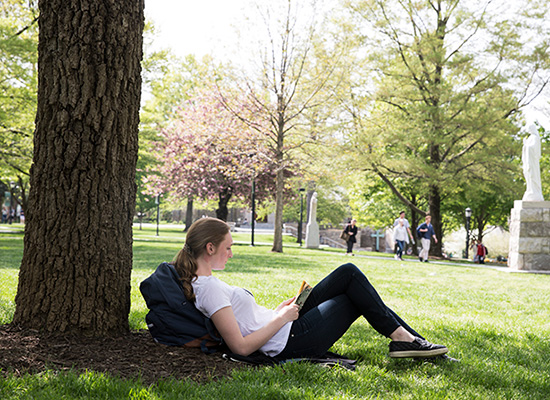Programs and Initiatives

Loyola Sustainability works collaboratively to reduce the environmental impact of the university and build a culture of sustainability. As sustainability evolves, so does Loyola Sustainability, but here's a peak at some of our permanent initiatives and programming.
- Loyola Arboretum
- Green Office Program
- Loyola Waste and Recycling
- Green Living Guide
- Good Stuff Campaign
- Earth Week
- Govanstowne Farmers' Market (York Road Initiative)
- Community Compost Bin
- Environmental Film Series
Curriculum
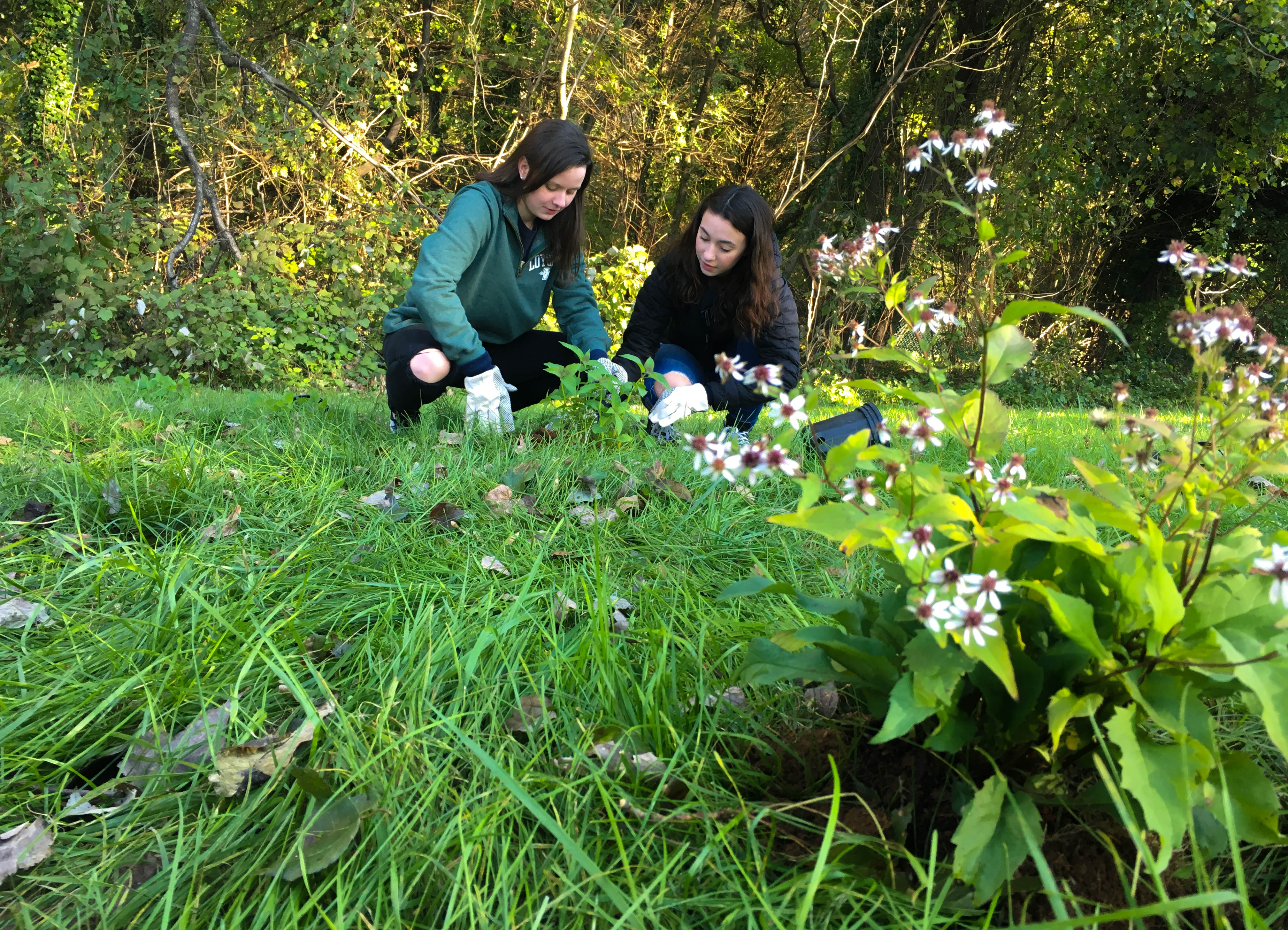
Biology students participate in a service learning native planting project on the Evergreen campus.
Sustainable Management Major
Students interested in how corporations deliver value to people, planet, and profit while creating and sustaining a competitive advantage can pursue the Sustainable Management Major.
Environmental Studies Minor
Students interested in learning more environmental issues and sustainable solutions can pursue the Environmental Studies minor.
Sustainability Related Courses
Not quite ready to add a minor? Undergraduate students also have access to dozens of sustainability focused courses across academic disciplines.
Energy and Emissions
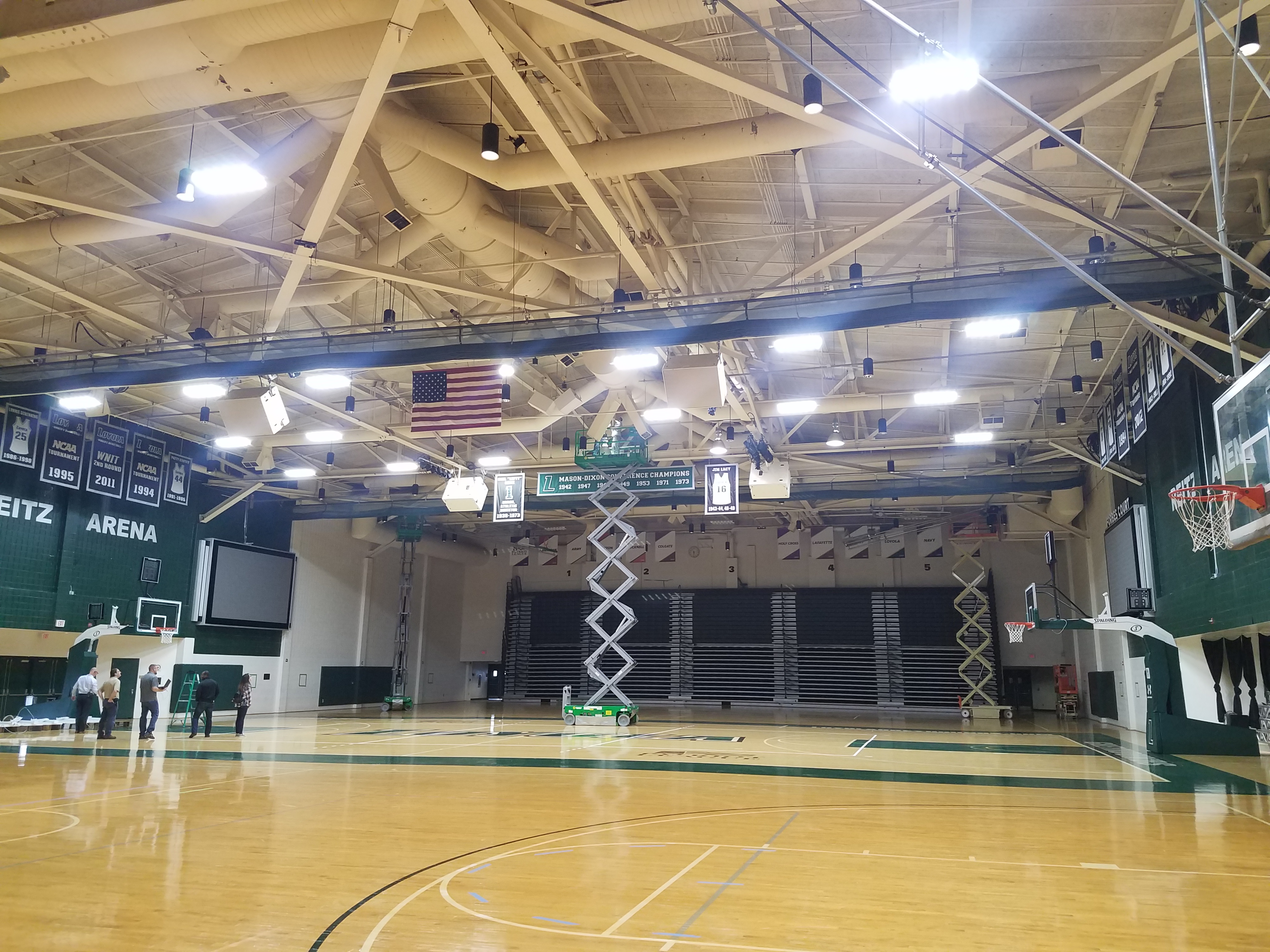
Completed LED lighting retrofit project in Reitz Area
Energy Reduction
Facilities staff use an advanced energy monitoring system to monitor energy efficiency across campus. This software allows staff to adjust building temperatures, change equipment settings and troubleshoot and solve problems with the click of a mouse.
The energy subcommittee of the Sustainability Committee brings together campus stakeholders to discuss and implement preventative upgrades, energy efficiency projects and explore opportunities to reduce Loyola’s energy consumption.
Energy Management Policy
The university enforces the energy management policy to guide fiscally and environmentally responsible energy use across campus.
Climate Action
15% of Loyola’s annual purchased electricity is powered by national wind power RECS. The university is committed to act on climate change, track and reduce our carbon footprint and make climate action a part of our campus culture. Learn more about Climate Action at Loyola.
Buildings and Built Environment
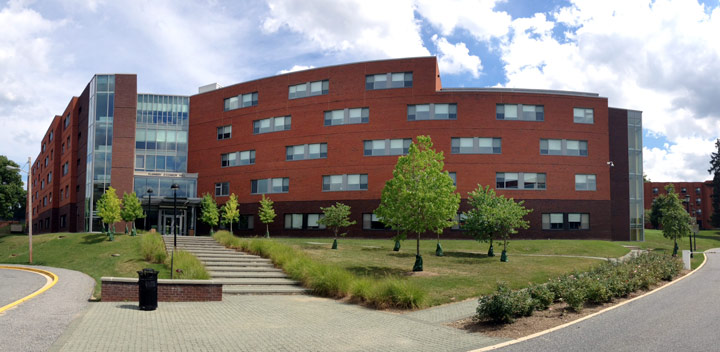
Exterior of Thea Bowman Hall, Loyola's most sustainable building.
Green Buildings:
All new buildings and renovations are constructed according to LEED Silver Equivalent standard. Loyola has also retro-fitted many buildings across our campus in order to make them more sustainable structures, including adding energy efficient light and water conservation fixtures throughout.
Loyola's green buildings are Thea Bowman Hall and Ridley Athletic Complex. Learn more about Loyola's Green Buildings.
Bird-Window Collisions:
According to the Portland Audubon, up to one billion birds die per year in the United States due to collisions with windows. Birds cannot perceive a window as a barrier. Often, windows show reflections, which appear as more open space that birds then fly into at high speeds. Some birds also perceive their own reflection as another bird, which becomes problematic when a male bird is defending territory. See below for a list of simple solutions to help mitigate this problem on campus:
- Cover windows with collision prevention patterns
- Bird deflectors
- Bird silhouettes
- Reduce the amount and intensity of artificial light at night
- Turn off internal lights at night
- Turn off outdoor lights or reduce intensity
- Close the blinds/shades when the space is not occupied
For more information contact sustainability@loyola.edu.
If you find an injured bird, locate a rehabilitation shelter near you at ahnow.org.
Water Refilling Stations
Loyola has many water refilling stations across campus so that you can reduce plastic and refill reusable drinkware. See a map of water refilling station locations.
Electric Chargers & Fleet
Loyola is committed to creating an EV-friendly campus. Since 2023, we’ve installed four dual-port EV charging stations across campus to support sustainable transportation.
We are also working toward transitioning our fleet of 150+ vehicles to all-electric. Currently, approximately 6% of our campus fleet is electric, and we’re continuing to make progress toward full electrification.
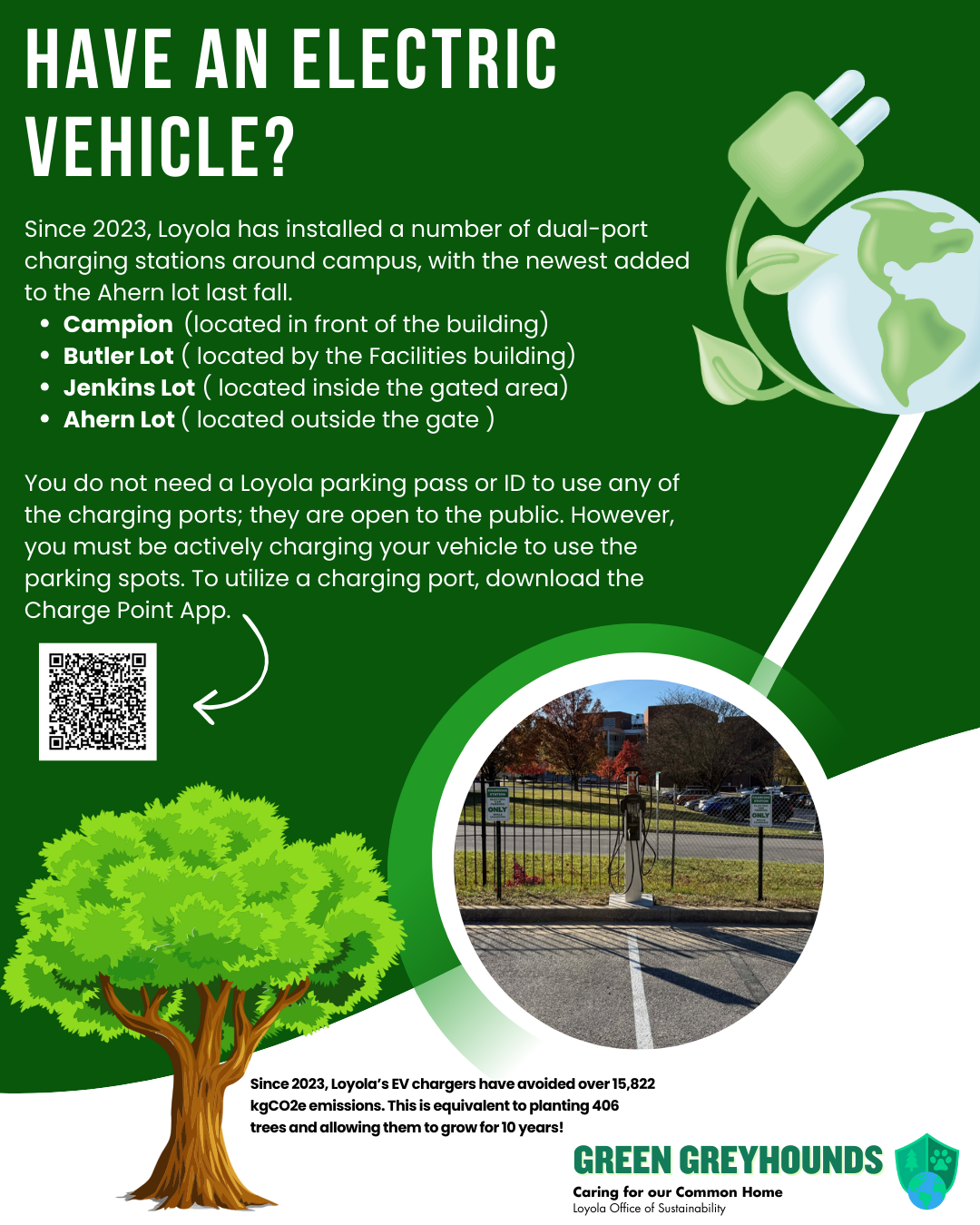
Sustainable Transportation
Loyola has many options available to those interested in walking, biking or using public transit to get around sustainably.
Campus Shuttle
Loyola’s parking and transportation department has a shuttle system that runs to several high traffic areas of campus all throughout the day. You can track the shuttles and theur arrival times online and on your phone. Learn more about the shuttle schedule.
Food and Dining
Loyola Dining works closely with the university to ensure our vibrant food service options support local growers and producers, our environment and our community. Loyola Dining and Evergreen Catering employ a number of initiatives to reduce waste in kitchens and dining rooms, buy local products and provide food and services back into our community.
Learn more about their various initiatives on the Loyola Dining sustainability website.
Landscape and Biodiversity

Native saddle back caterpillar Acharia stimulea spotted behind Newman Towers.
The Loyola Landscaping and Grounds works closely with Loyola Sustainability to reimagine the campus landscape to protect and enhance biodiversity and inspire environmental stewardship.
Native Gardens
Grounds Department is committed to native and pollinator friendly landscaping. Native plants and shrubs are a feature throughout campus gardens, including at Campion Towers, Thea Bowman Hall, Maryland Hall, Ridley Athletic Complex, LND Library and the Peace Meadow.
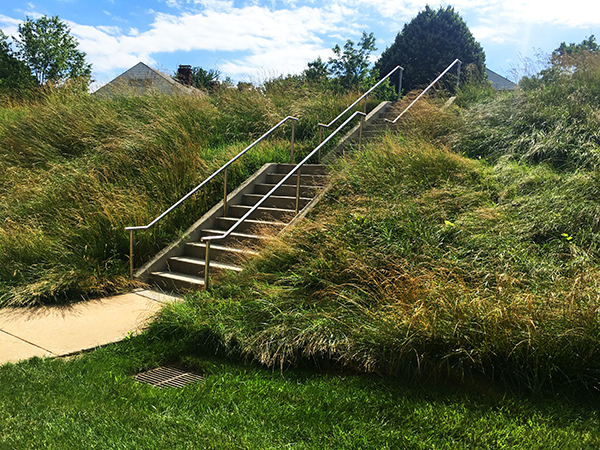
No-Mow Area at Southwell Hall
No-Mow Areas
Multiple no-mow areas have been established on slopes across campus to reduce storm water run-off and support local biodiversity. You can find no mow areas outside of Southwell Hall, Avila Hall and the LND Library.
Loyola Arboretum
Loyola University Maryland is committed to protecting and engaging our campus in the trees of Loyola. The Evergreen Campus is a certified Arboretum.
Conservation and Experiential Learning Garden (CELG)
Loyola faculty, staff and students transformed 12,000 sf of traditional grass lawn into an interactive certified native wildlife habitat and expanded organic vegetable garden. The Conservation and Experiential Learning Garden (CELG) successfully expands the role of the Evergreen Campus to enhance and protect native biodiversity, facilitate meaningful interactions with the environment and support experiential education opportunities.. Learn more about the garden.
Water Conservation
Water conserving low flow fixtures are installed across campus. Shower heads in residence halls were retrofitted to modern low flow models to help students conserve fresh water in their residence hall in 2017.
Waste Reduction and Recycling
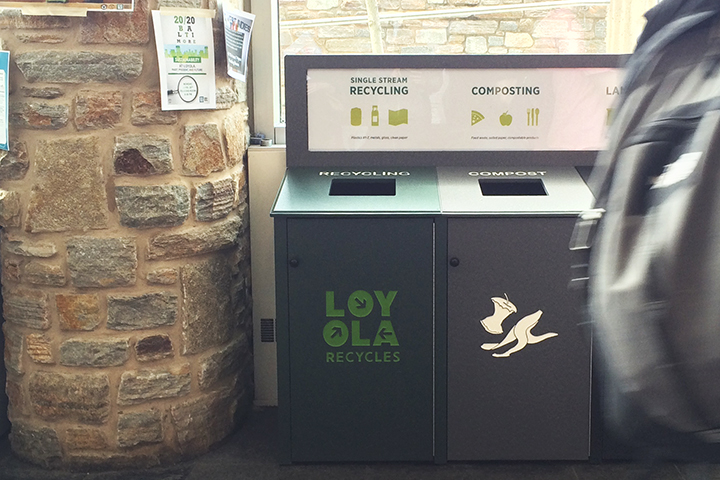
The university is committed to reducing waste on our campus and diverting waste from the landfill whenever possible.
Loyola Recycles
Single-stream recycling is available in all residential and administrative buildings. Visit Loyola's Waste, Recyling, and Compost webpage for more information.
Hazardous waste, batteries, electronics, furniture and appliances are also diverted from the landfill and recycled.
Composting
As part of the Baltimore Comprehensive Composting Pilot in partnership with the U.S. Department of Agriculture, Natural Resources Conservation Service (NRCS), the Mayor and City Council of Baltimore, Johns Hopkins University, and the University of Maryland – Baltimore, we are pleased to offer a community compost drop-off site during the Govanstowne Farmer’s Market this summer! The overarching goal of the Baltimore Comprehensive Composting Pilot is to increase Baltimore City residents’ and communities’ access to composting and food waste reduction opportunities by removing long standing educational, social, and economic barriers.
Loyola dining diverts kitchen and café waste from the landfill. Compostable serve ware and food waste is collected and processed into rich soil by our local commercial composting service provider Waste Neutral.
Hydration Stations
Green greyhounds carry a reusable water bottle to stay hydrated on the go and fill up at the hydration stations available across camps. Find the nearest hydration station.
Good Stuff Campaign
Don’t Dump, Donate! Loyola Sustainability recruits a team of students each year to help collect thousands of student items during move out to distribute to local organizations. Visit the Good Stuff website to find your donation station.
Cool Carpet
Interface Cool Carpet is installed throughout Loyola residence halls. Cool carpet is carbon neutral carpet squares made from recycled materials and is easily recycled at the end of its useful life.
